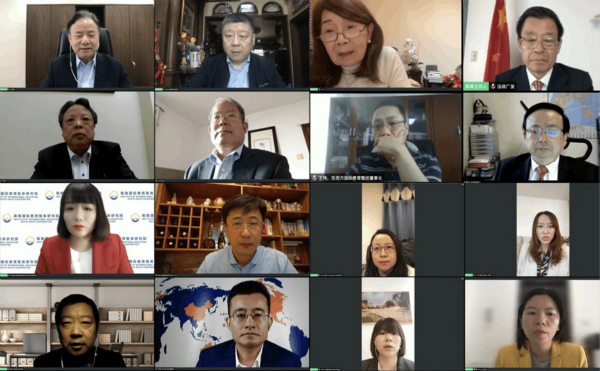
[Photo courtesy of Research Institute of International Education South-South Cooperation]
Since the outbreak of the new coronavirus epidemic, many parents have expressed anxiety about sending their children to study abroad or even sending them to domestic international schools.
In response to various concerns, and to mitigate the negative effect brought about by the current pandemic to the international education industry, a webinar entitled "The Strategy and Development of International Education Coping with the Challenge of COVID-19 Pandemic" was held jointly on April 20 by Committee on Study Abroad Services of the China Education Association for International Exchanges (CEAIE) and the Research Institute of International Education South-South Cooperation.
Chinese and foreign experts, including officials from the international education industry-related sector and heads of international education institutions, shared their insights about the future of the industry and gave practical suggestions for anxious parents and students.
Experts at the webinar believed that the epidemic hasn't undermined the importance of studying abroad, and the development trend of the industry will not change. They called for countries to increase cooperation to jointly meet challenges.
Cen Jianjun, chairman of the Committee on Study Abroad Services, CEAIE, and the Research Institute of International Education South-South Cooperation, said in his opening speech that over more than 40 years of China's reform and opening up, returned overseas students had made significant contributions for their motherland's development.
Currently, there are more than 1.4 million Chinese students studying abroad. These students, together with those who will follow, will become valuable resources for China, Cen predicted.
Noting that many parents have expressed anxiety about sending their children to study abroad or sending them to domestic international schools since the COVID-19 crisis, Cen hoped the webinar could provide them some practical solutions.
He offered an analysis on the relationship of international education with China-U.S. relations and with talent cultivation respectively, and believed that the basics of Chinese-American exchanges had not changed.
"Only through strengthening international education can we meet our country's needs for innovative talents," Ceng said.
Zhang Ning, deputy secretary general of the China Scholarship Council (CSC) expected the number of students going abroad in the first half of this year will naturally drop sharply due to the pandemic.
Prospects for the Autumn semester would directly depend on the development of the pandemic and the related policies of various countries. However, in spite of the setback, he believed there were also opportunities under the current situation and stressed the role of studying abroad from four aspects: broadening global vision, improving global competence, learning advanced technology and respecting diversity.
The guest speakers also stressed the importance of unity, solidarity and consensus in addressing the common challenge.
Dr. Wang Guangfa, principal of Beijing Royal School, pointed out that the epidemic had broken the current international order of political, economic, bilateral, and multilateral relations. However, there would be more education and cultural exchanges. And the pandemic actually offered the priority being given to education development a truer strategy.
"Education is without borders. We must be innovative and push forward the globalization of education," said Wang, who is also vice president of the Council for Promoting South-South Cooperation (CPSSC) and chairman of Fazheng Group.
The video conference was the second of a series of activities focusing on the theme of "Education Under the Influence of COVID-19." It lasted for almost four hours and attracted more than 260,000 viewers to watch in real time.




